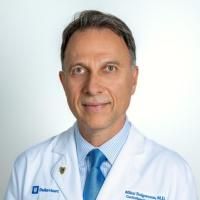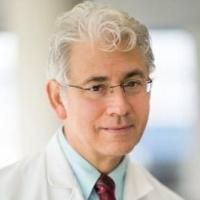Platelet Counts, Acute Kidney Injury, and Mortality after Coronary Artery Bypass Grafting Surgery.
Date
2016-02
Journal Title
Journal ISSN
Volume Title
Repository Usage Stats
views
downloads
Citation Stats
Attention Stats
Abstract
BACKGROUND: Cardiac surgery requiring cardiopulmonary bypass is associated with platelet activation. Because platelets are increasingly recognized as important effectors of ischemia and end-organ inflammatory injury, the authors explored whether postoperative nadir platelet counts are associated with acute kidney injury (AKI) and mortality after coronary artery bypass grafting (CABG) surgery. METHODS: The authors evaluated 4,217 adult patients who underwent CABG surgery. Postoperative nadir platelet counts were defined as the lowest in-hospital values and were used as a continuous predictor of postoperative AKI and mortality. Nadir values in the lowest 10th percentile were also used as a categorical predictor. Multivariable logistic regression and Cox proportional hazard models examined the association between postoperative platelet counts, postoperative AKI, and mortality. RESULTS: The median postoperative nadir platelet count was 121 × 10/l. The incidence of postoperative AKI was 54%, including 9.5% (215 patients) and 3.4% (76 patients) who experienced stages II and III AKI, respectively. For every 30 × 10/l decrease in platelet counts, the risk for postoperative AKI increased by 14% (adjusted odds ratio, 1.14; 95% CI, 1.09 to 1.20; P < 0.0001). Patients with platelet counts in the lowest 10th percentile were three times more likely to progress to a higher severity of postoperative AKI (adjusted proportional odds ratio, 3.04; 95% CI, 2.26 to 4.07; P < 0.0001) and had associated increased risk for mortality immediately after surgery (adjusted hazard ratio, 5.46; 95% CI, 3.79 to 7.89; P < 0.0001). CONCLUSION: The authors found a significant association between postoperative nadir platelet counts and AKI and short-term mortality after CABG surgery.
Type
Department
Description
Provenance
Subjects
Citation
Permalink
Published Version (Please cite this version)
Publication Info
Kertai, Miklos D, Shan Zhou, Jörn A Karhausen, Mary Cooter, Edmund Jooste, Yi-Ju Li, William D White, Solomon Aronson, et al. (2016). Platelet Counts, Acute Kidney Injury, and Mortality after Coronary Artery Bypass Grafting Surgery. Anesthesiology, 124(2). pp. 339–352. 10.1097/ALN.0000000000000959 Retrieved from https://hdl.handle.net/10161/11161.
This is constructed from limited available data and may be imprecise. To cite this article, please review & use the official citation provided by the journal.
Collections
Scholars@Duke

Edmund Hilton Jooste
Dr Jooste’s initial research focus was in the investigation of the smooth muscle airway effects of various non-depolarizing muscle relaxants. Recently, Dr Jooste has been involved in clinical research, investigating the pharmacokinetics and pharmacodynamics of anesthetic agents in children and in particular the cardiovascular effects of dexmedetomidine. His clinical practice focuses on the anesthesia care of children with congenital cardiac disease.

Yi-Ju Li
My research interest is in statistical genetics, including statistical method development and its application for understanding the genetic predisposition of human complex diseases. Here is the list of research topics:
- Statistical genetics: development of family-based association methods for quantitative traits with or without censoring and for detecting X-linked genes for disease risk. With the availability of next generation sequencing data, we have ongoing projects to develop the association methods for testing rare variants for different phenotypic measures.
- Genetics of Alzheimer's disease (AD) and Fuchs endothelial corneal dystrophy (FECD).
- Genetic basis of age-at-onset of Alzheimer disease.
- Peri-operative genomic studies. Investigate the genetic risk factors for postoperative outcomes of patients underwent non-emergent coronary artery bypass grafting with cardiopulmonary bypass.

Solomon Aronson
Solomon Aronson, MD, MBA, FACC, FACCP, FAHA, FASE
Solomon Aronson is a tenured professor at Duke University and Executive Vice Chairman in the Department of Anesthesiology.
Dr. Aronson earned his BS in molecular biology with distinction at the University of Wisconsin in Madison, and his MD with honors in research at the Medical College of Wisconsin in Milwaukee. After completing an anesthesiology residency including a year as chief resident at the University of Texas Medical Branch in Galveston, he completed a fellowship in cardiac and vascular anesthesia at the Texas Heart Institute in Houston. Thereafter was recruited to the University of Chicago where he ascending to the rank of full professor and served as chief of the cardiothoracic and vascular anesthesia division for 12 years. In 2011, Dr. Aronson received his MBA with a concentration in Health Sector Management at Duke University Fuqua School of Business.
Having written over 300 manuscripts, book chapters, abstracts as well as 5 textbooks, he is recognized as an expert on topics concerning perioperative echocardiography, surgical anticoagulation and blood management, perioperative blood pressure risk, healthcare strategy and health economics as well as other related topics in cardiovascular anesthesia and cardiology, he has lectured nationally and internationally.
Among the many research awards and lecture honors received over the years, Dr. Aronson has been repeatedly elected from among his peers to be listed in Best Doctors in America. Dr. Aronson continues to serve on the Joint Commission and AMA task force for overuse as well as the FDA as a consultant SGE after having served on the FDA as a member of the Anesthesia and Life support advisory committee and Anesthetic and Analgesic Drug Products Advisory Committee (AADPAC). He is an elected fellow of the American Heart Association, the American College of Chest Physicians, the American College of Cardiology, and the American Society of Echocardiography and an elective member of the Association of Cardiovascular Anesthesiologist and Association of University Anesthesiologists.
Dr. Aronson is the director of strategic business development for the Physicians Diagnostic Clinic (PDC), a 1600 member physician practice group at Duke and has severed as chair of the Finance Committee for the PDC in the past. He currently serves on the PDC Board of managers. He has served as a member of the economic committee of the American Society of Anesthesiologists for over 10 years and currently serves on the Future Models of Anesthesia Practice committee for the ASA. In addition, he served on the board of directors and was president of the intraoperative council in the American Society of Echocardiography and he also served on the board of directors and was president for the Society of Cardiovascular Anesthesiology. He remains on the board of trustees for the Society of Cardiovascular Anesthesiology and the Society of Cardiovascular Anesthesiology Foundation. He is a founding trustee member of the National Board of Echocardiography and has served on their board of directors. In 2013, he was elected to serve on the Science Accelerator Committee and the Leadership Committee for Cardiopulmonary, Critical Care, Perioperative & Resuscitation Council of the American Heart Association.
Dr. Aronson is married to Dr. Leena Sharma and they have 2 children – twins- in college. In addition to enjoying time with his family, he works at his tennis and golf games, listens to music, pursues drawing and painting interests and enjoys traveling and serving his community. He currently serves on the board of directors for the Boys and Girls Club of America in Durham.

Mihai V. Podgoreanu
Basic-Translational:
1. Systems biology approaches to modeling perioperative cardiovascular injury and adaptation.
2. Mechanisms of perioperative myocardial injury; functional genomics applied to perioperative myocardial injury.
3. Metabolic consequences of perioperative myocardial ischemia-reperfusion injury.
4. Animal models and comparative genomic approaches to study perioperative myocardial ischemia-reperfusion injury.
5. Functional genomics of vein graft disease.
6. Animal models of vein graft disease.
7. Genetic association studies in perioperative medicine.
8. Clinico-genomic risk prediction models for perioperative and long-term adverse cardiovascular outcomes following cardiac surgery.
Clinical:
9. Intraoperative quantification of tissue perfusion by contrast echocardiography.
10. Use of myocardial tissue deformation indices to characterize perioperative ventricular dysfunction/stunning
11. 3-D echocardiographic evaluation of the right ventricle

Jeffrey Giles Gaca

Ian James Welsby
As a practicing cardiothoracic anesthesiologist, I have contributed to the better understanding of the management and of perioperative thrombosis (particularly HIT). This has been as a Duke site PI for the Rare Thrombotic Diseases Consortium led by Dr T.L Ortel and a clinical collaborator with the basic and translational science approach to HIT led by Dr G Arepally. I have also championed novel approaches to dealing with perioperative HIT such as plasmaperesis.
Similarly, I have been a local leader in establishing management of transfusion approaches to major cardiac surgery including the novel introduction of autologous plateletpheresis to limit exposure to allogeneic platelet transfusions in this highly transfused population, identifying the transfusion requirements during thoracic aortic reconstruction and promoting use of a lower dose of rFVIIa use in this population, changing established clinical practice.
My research interests focus on perioperative transfusion and hematology concerns. Recently, Dr Kor (Mayo Clinic) and I received a multiple PI R-01 award to evaluate point-of-care/bedside washing of packed red blood cells to reduce perioperative lung injury. This novel repurposing of commonly available “cell-saver” technology is, for most surgical cases, the only practical means of delivering a washed product, and promises to be a critical advancement in perioperative transfusion medicine. I also have a longstanding interest in the rejuvenation of RBCs to normalize oxygen delivery capacity of transfused RBCs. Such a development will be of tremendous importance to transfusion practice, particularly for highly transfused populations and with current threats to blood banking inventory.
In summary, I have dedicated my research career to improving the outcome of patients undergoing cardiothoracic surgery, understanding perioperative coagulopathy, and optimizing transfusion practice.

Jerrold Henry Levy
Jerrold Levy is Professor of Anesthesiology, Critical Care, and Surgery (Cardiothoracic) at Duke University Medical Center in Durham, NC. He obtained his medical degree from the University of Miami, where he was an intern in internal medicine, and undertook his residency in the Department of Anesthesiology of the Massachusetts General Hospital and Harvard Medical School in Boston, where he was also Chief Resident, and completed fellowships in both Respiratory ICU and Cardiac Anesthesiology. He previously was Professor, Deputy Chair for Research, and Chief of Cardiothoracic Anesthesiology at Emory University School of Medicine. His clinical and research interests include anticoagulation and its reversal, therapeutic strategies to prevent and treat coagulopathy and acute inflammatory responses in critically ill patients, clinical applications of recombinant and purified protein concentrates to treat bleeding, and pharmacologic approaches to treat shock. He is currently Chair of the Subcommittee on Perioperative and Critical Care Thrombosis and Hemostasis for the International Society of Thrombosis and Hemostasis, Executive Editor of Anesthesiology, and consultant to the FDA‘s Biologic Products Advisory Committee. He is the author of over 450 publications on PubMED, with over 100,000 citations on Google Scholar and a h-index of 95. He is also fluent in French and conversational in Spanish and Japanese.

Mark Stafford-Smith
My research interests are in the area of Cardiothoracic Anesthesiology. The main focus of my research is towards the understanding and prevention of acute kidney injury after cardiac and other major surgeries. Secondary interests include the study of analgesic strategies after cardiothoracic surgical procedures, performance of clinical trials, and perioperative transfusion and hemostasis.
Unless otherwise indicated, scholarly articles published by Duke faculty members are made available here with a CC-BY-NC (Creative Commons Attribution Non-Commercial) license, as enabled by the Duke Open Access Policy. If you wish to use the materials in ways not already permitted under CC-BY-NC, please consult the copyright owner. Other materials are made available here through the author’s grant of a non-exclusive license to make their work openly accessible.
